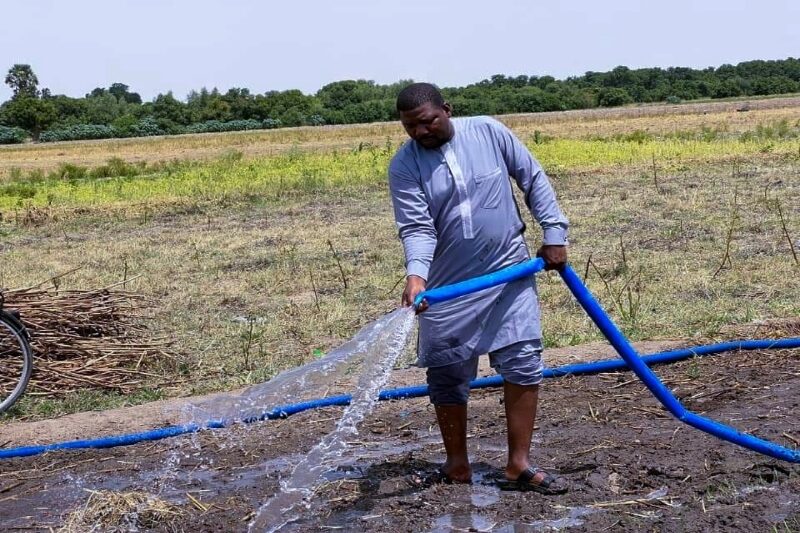The low and erratic rain during the wet season this year has prompted religious leaders and traditional rulers in Borno State to enjoin thousands of farmers and others to pray earnestly to Almighty Allah to intervene to provide steady rainfall, without which is it likely that most crops will die.
On Monday, July 17, community leaders told Muslims in Maiduguri to observe the two Rakat congregational prayers – Salatul Istisqa’a – to seek divine intervention for steady rainfall in the state.
Similar special congregational prayers were observed in the Dikwa, Konduga, Jere, Mafa and Kaga local government areas.
Last year, farmers were overwhelmed by massive rains that resulted in rivers overflowing their banks and huge floods. This year, farmers are struggling desperately to keep their crops alive because of little to no rain.
Many farmers, fearing an imminent drought, have resorted to manually irrigating their lands. Some are fetching water from boreholes or using pumps to hydrate their lands so that the seeds planted will germinate and grow.
But this has resulted in further challenges. The exorbitant hike in the price of fuel is hitting farmers hard. Manual irrigation is a costly business.
Farmer Masa Aisami Shokari, who has already planted his seeds, said that if it did not rain soon there was a risk of poor germination and his seedlings would die.
He has begun manually watering his lands.
“It is a challenge to water the farm because it is not easy to fetch water from a river or borehole to hydrate the whole area. And, if we use machines to pump water, it costs a fortune because of the hike in fuel prices. Before the price spike, we were paying ₦1,000 for enough fuel to do the job. But now it costs more than ₦1,500 for two to three litres of fuel. We need rain. May Allah help us.”
Alhaji Maina Kwata Musine said he was using two or three watering cans to hydrate his land. He said the crops needed more water and that doing it by hand was a challenge.
Ibrahim Alhaji Modu Gana said the lack of rain had affected the crops, particularly for those large-scale farmers who had planted millet, sorghum, beans and maize on land that was not close to riverine areas because there was nothing they could do except wait, hope and pray for rain.
“I’m praying for Almighty Allah to intervene.”
Abdulrahman Ahmed Bundi, a rice farmer, said he owned about three hectares of land and had been farming near the riverine areas in Gongolon in the Jere Local Government Area for years. He was able to water the whole area within two days if he used a pump.
“I planted rice seeds immediately after the Eid-El-Kabir celebration. Since then has not rained for three weeks. I was forced to buy four or five litres of fuel to run the pump, getting water from a borehole. It is expensive for large-scale farmers to water their crops this way. Only small-scale farmers whose lands are close to a river can water their lands.”
Mohammed Musa, an agricultural expert at the Borno State Agricultural Development Programme, said the erratic rainfall during this year’s wet season could destroy planted crops because the seeds would not properly germinate.
It was likely, he said, that many farmers would lose their crops.
“The lack of rain is causing a drought which is depleting the underground water reserves. It is worrying because this could result in farmers losing their crops. It is not sustainable for farmers to use pumps and other resources to water their lands. And this is particularly so for large-scale farmers of millet, sorghum and beans.
“Farmers should seek tips from agricultural experts, who will advise them to use improved, drought-resistant varieties of seeds. Obviously, irrigation farming is different from seasonal farming. If they depend on water from sources other than rain it is irrigation, not seasonal, farming. Perhaps 20 years ago it was possible for large-scale farmers to afford to hydrate their lands to draw water from riverine areas and boreholes. But it’s not sustainable these days.”
He discouraged farmers from watering their lands “for nothing”, adding that only drought-resistant seeds, which needed less time to germinate, were likely to grow with a good balance of rain and proper irrigation.
“The erratic rainfalls we are experiencing this year are likely to destroy crops because the seeds farmers use need good and constant rainfall. If farmers have to irrigate their lands by other means, the cost could be excessive.”
SHETTIMA LAWAN MONGUNO






